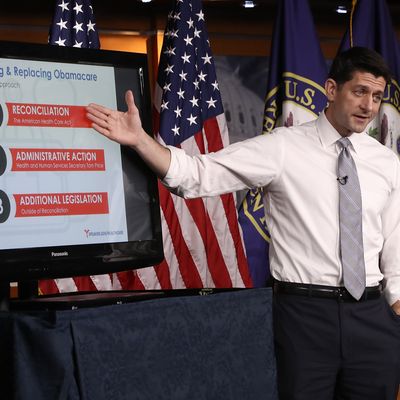
The general reaction to the long-awaited Congressional Budget Office’s “scoring” of the American Health Care Act was shock at how bad it was for the Republican congressional leaders to whom CBO reports. The estimated health-care coverage losses of 14 million in the first year alone and 24 million within ten years was flabbergasting. Axios’ post on the “score” featured a mushroom cloud. Ezra Klein opined that “[t]his CBO report is so much worse for Republicans than I thought possible.”
While as of this writing there has been no reaction from the president, HHS Secretary Tom Price said the administration “disagreed strenuously” with the report. He also previewed what we can expect to be a regular feature of GOP criticism of the CBO report: It doesn’t examine future legislation and regulatory reactions that will either save costs or improve coverage. Trouble there, of course, is that such future actions will not be included in the budget-reconciliation bill that is the vehicle for AHCA, which means at least eight Senate Democratic votes will be necessary.
But the most comprehensive immediate GOP reaction was from Speaker Paul Ryan, and he chose to cherry-pick the report extensively:
This report confirms that the American Health Care Act will lower premiums and improve access to quality, affordable care. CBO also finds that this legislation will provide massive tax relief, dramatically reduce the deficit, and make the most fundamental entitlement reform in more than a generation. These are things we are achieving in just the first of a three-pronged approach. It’s important to note that this report does not take into consideration additional steps Congress and the Trump administration are taking that will further lower costs and increase choices.
I recognize and appreciate concerns about making sure people have access to coverage. Under Obamacare, we have seen how government-mandated coverage does not equal access to care, and now the law is collapsing. Our plan is not about forcing people to buy expensive, one-size-fits-all coverage. It is about giving people more choices and better access to a plan they want and can afford. When people have more choices, costs go down. That’s what this report shows. And, as we have long said, there will be a stable transition so that no one has the rug pulled out from under them.
This is, to put it mildly, a disingenuous take. According to CBO, the AHCA will actually boost premiums in the short term, and will boost them even more for poorer and older Americans. It does not, in fact, improve “access to quality, affordable care” — the insufficiency of its tax credits are a big reason for the coverage losses CBO anticipates. Ryan’s argument that this is just part of a “three-pronged approach” is specious for the reason I mentioned above: The idea that any iteration of this deeply broken Republican health-care plan will conceivably command 60 votes in the Senate is pure fantasy.
The one thing Ryan got right is that the CBO estimates the $935 billion in spending reductions via smaller tax credits and Medicaid cuts — all mostly affecting the working poor — will exceed the $599 billion in tax cuts, mostly targeted to the wealthy. That’s not an argument that will fare very well once it is understood.
The argument that people losing coverage have the freedom to decide they don’t want it anyway isn’t a big winner, either. I would expect some reactions to Ryan to quote songwriter Kris Kristofferson to the effect that “freedom’s just another word for nothing left to lose.”
Perhaps Republicans will regroup overnight and come up with more convincing responses. Or maybe they will respond to the mushroom cloud of this CBO report simply by going nuclear on the source.






























